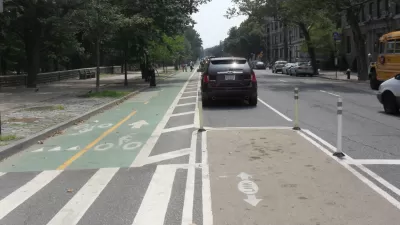The Milken Institute Global Conference brought hoards of business leaders to Beverly Hills last week. Sessions included some high praise for cities and buoyant predictions about innovation, development, and accommodating six billion city-dwellers.

As placeless as capital may seem, a huge share of the world's wealth is generated in cities. The top 600 global cities account for 60 percent of the world's economy, in fact. That's why it only stands to reason that the business leaders who attended the Milken Institute Global Conference in Beverly Hills should be concerned about the health and functionality of the world's cities.
Sessions focused on entrepreneurship in Los Angeles, global development, technological innovations, infrastructure investment, and the rebirth of Detroit. Urban problems, such as poverty and poor education, got little attention, but otherwise cities emerged as crucial places not only for living and working but also for investment and economic development.
"You pass the Splenda to a CEO in the coffee line and realize that the annual revenue of his or her company might exceed that of a city’s budget, or even its gross metropolitan product. That’s humbling. It’s more humbling when you consider that some of these companies, from Twitter to Google to all the finance companies, hardly exist in physical space. They might employ a handful of people and deliver all of their products online."
"Connections matter more than typologies, and diversity matters more than comparative advantage does. Planners have known this for a long time. The future is about mixed-uses, placemaking, design, and neighborhoods. It’s time developers and funders figured it out too."
FULL STORY: World's Business Leaders Converge on L.A., Give a Few Nods to Cities

Maui's Vacation Rental Debate Turns Ugly
Verbal attacks, misinformation campaigns and fistfights plague a high-stakes debate to convert thousands of vacation rentals into long-term housing.

Planetizen Federal Action Tracker
A weekly monitor of how Trump’s orders and actions are impacting planners and planning in America.

San Francisco Suspends Traffic Calming Amidst Record Deaths
Citing “a challenging fiscal landscape,” the city will cease the program on the heels of 42 traffic deaths, including 24 pedestrians.

Defunct Pittsburgh Power Plant to Become Residential Tower
A decommissioned steam heat plant will be redeveloped into almost 100 affordable housing units.

Trump Prompts Restructuring of Transportation Research Board in “Unprecedented Overreach”
The TRB has eliminated more than half of its committees including those focused on climate, equity, and cities.

Amtrak Rolls Out New Orleans to Alabama “Mardi Gras” Train
The new service will operate morning and evening departures between Mobile and New Orleans.
Urban Design for Planners 1: Software Tools
This six-course series explores essential urban design concepts using open source software and equips planners with the tools they need to participate fully in the urban design process.
Planning for Universal Design
Learn the tools for implementing Universal Design in planning regulations.
Heyer Gruel & Associates PA
JM Goldson LLC
Custer County Colorado
City of Camden Redevelopment Agency
City of Astoria
Transportation Research & Education Center (TREC) at Portland State University
Jefferson Parish Government
Camden Redevelopment Agency
City of Claremont





























